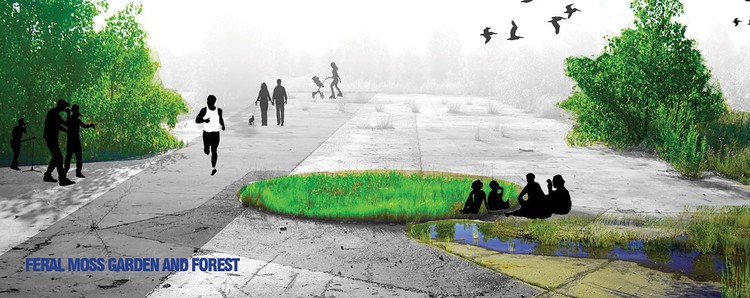
Across industrial North America, many small working class cities are faced with a plethora of abandoned property due to the downfall of the automotive industry. The prolific ruins of the largest abandoned factory in North America, Detroit's Packard Motor Plant, have served as an emblem for dozens of similar plants dotting the landscapes of cities across the continent. In 2010, shortly after the beginning of the global economic crisis, Chrysler closed a sprawling engine factory in Kenosha, Wisconsin. The factory has since been demolished and is now at the beginning of a five-year cleanup. Located adjacent to a densely populated suburban development, the 107-acre property begs the question: what can be done with such a massive piece of land?
In response to Kenosha's Chrysler problem, a team of urbanists, architects and researchers known as Urban Design for Everyone (UD4U) launched a global competition to reinvigorate the former industrial property. Proposals had to take the adjacent neighborhoods into consideration, with the ultimate goal of bridging gaps between disparate communities at opposite ends of the property. The winning proposals range widely from a stylized village of housing, to the creation of enormous urban farms, to the construction of an innovation park featuring a series of vast artificial lakes. After receiving 43 entries from 17 countries, a jury of local architects selected three exceptional proposals and five honorable mentions. Find out what the teams proposed after the break.
FIRST PLACE: Kenosha High Res
Lasha Brown, Sandra Arndt, Emilia Kaia Landsbergis, Robert Hon
United States

Described as "reactive and proactive," Kenosha High Res is designed to respond to community needs and allow for change over time. The proposal allows for gradual development, with an eye towards integrating nearby communities through public green space.

Presentation Boards:
SECOND PLACE: From the Rust Belt to a Ring of Events
Jaime Sarmiento Pastor, Javier Lazarte, Nikolas Briceno, Miguel Linares
Peru

This project proposes the conversion from industrial to innovation park, focusing on empowering community members and the local economy through responsible design. The proposal includes the construction of man-made lakes and public outdoor pavilions.

Presentation Boards:
THIRD PLACE: In Flux
Matt Perotto, Rob McIntosh, Megan Esopenko
Canada

In Flux proposes the creation of a green corridor replete with agriculture, forestry and hydro generation. The project team seeks to invigorate the land through a viable division of the space into strips, similar to early North American farming grids.

Presentation Boards:
HONORABLE MENTION: Moto-Scape: Kenosha Speedway
Andrew Dawson, Jamie Granger
United States

Perhaps the most wild proposal, Moto-Scape suggests the construction of a driving track along the periphery of the site while a lush recreation park replete with tennis courts and green space completes the interior.

Presentation Boards:
HONORABLE MENTION: Biotic Engineering
Peter Kennedy
Northern Ireland

Biotic Engineering lets nature take its course. Proposing a controlled overgrowth of sorts, the space is designed to evolve organically with the help of landscaped community event space and residential accommodation.

Presentation Boards:
HONORABLE MENTION: Made in Kenosha
Matthew Tucker
United States

Made in Kenosha, as its name suggests, proposes to build on the local economy through fostering small businesses. The proposal brings companies ordinarily located outside the city right to the heart, including wineries, farms and micro-breweries.

Presentation Boards:
HONORABLE MENTION: Patchwork Agriculture
Jean Yang, Kate Gmyrk, Anne Clark, Fallon Lebedowicz
United States

Patchwork Agriculture proposes the simultaneous urbanization and de-urbanization of the site through the addition of city streets and the creation of a series of micro-farms known as "agricultural incubator spaces."

Presentation Boards:
HONORABLE MENTION: Autolink Park
Jacob G. Jordan, Joe Stefanich, Efrain Cano, Ryan Guetschow
United States

Building on the site's history as a hub for automotive development, Autolink Park is a mixed-use development comprising educational buildings, private enterprise, public green space, and private housing.

Presentation Boards:
Find out more about Urban Design for Everyone and their project to reinvigorate Kenosha's Rust Belt here.


.jpg?1441316488)
.jpg?1441316526)












.jpg?1441316451)
.jpg?1441316405)
